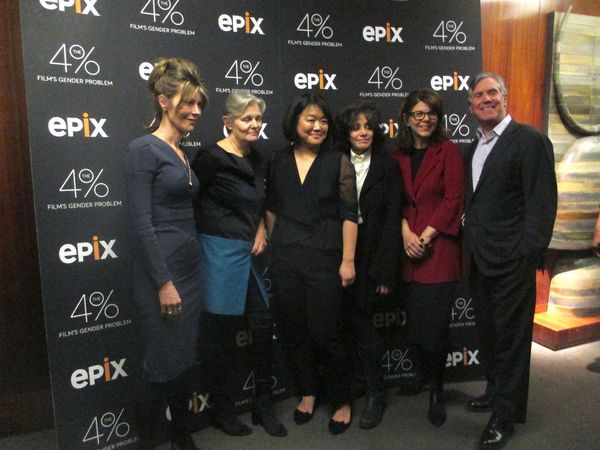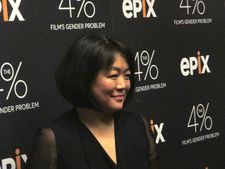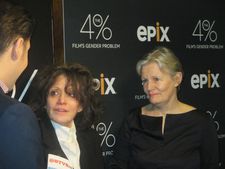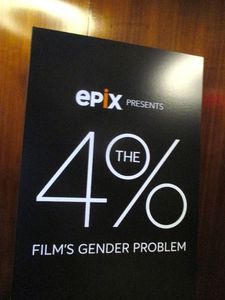 |
| Elle Editor-in-Chief Robbie Myers, Mary Harron, Caroline Suh, Amy Heckerling, Dr. Stacy Smith and Epix president-CEO Mark Greenberg Photo: Anne-Katrin Titze |
Christine Baranski, Maria Bartiromo, Joanna Coles, Katie Couric, Cristina Cuomo, Natasha Lyonne, Alec Baldwin, Baz Luhrmann, Marlo Thomas and Robbie Myers invited us to the Epix preview screening of Caroline Suh's The 4%: Film’s Gender Problem, executive produced by Alex Gibney, Stacey Offman, Lynne Kirby, Betsy West, Laura Michalchyshyn and Suh, and included guests Anne Sweeney, Cathy Schulman, Candace Bushnell, Alison Wright, Leven Rambin, Domenico Vacca and Eleonora Pieroni at the Museum of Arts and Design in New York.
 |
| Caroline Suh: "Manohla Dargis' article where she talked about Ava DuVernay" Photo: Anne-Katrin Titze |
The first episode featured Anjelica Huston, Patricia Clarkson, Julie Delpy, Amy Berg, Judd Apatow, Christine Vachon, Mira Nair, Michael Moore, Lake Bell, James Franco, Kristen Wiig, Michael Mann, Paul Feig, Catherine Hardwicke, A. O. Scott, Sam Taylor-Johnson, Dawn Hudson, Jill Soloway, Thompson on Hollywood's Anne Thompson, Women and Hollywood's Melissa Silverstein, Mary Harron, Amy Heckerling and Caroline Suh - all sharing their thoughts on the gender gap that exists on many levels and professions in filmmaking.
The 4% figure comes from the research of Dr. Stacy Smith, founder and director of the Media, Diversity, and Social Change Initiative at University of Southern California’s Annenberg School for Communication & Journalism. She found that of the 1,300 highest-grossing films released between 2002 to 2014, only 4.1% were directed by women.
On International Women’s Day, I spoke with the director of The 4%: Film’s Gender Problem about how pervasive the gender problem is.
Anne-Katrin Titze: Tell me how this project started. What was the initial spark?
 |
| Mark Greenberg and Anne Sweeney with Alex Gibney Photo: Anne-Katrin Titze |
Caroline Suh: I've been working in the industry for a long time, but on the documentary side, which is slightly different. I've been wanting to do the project for a long time, intuitively feeling that there is inequality going on. The thing that really spurred me on to actually try and make it happen was Manohla Dargis' article [NY Times - Making History With ‘Selma,’ Ava DuVernay Seeks a Different Equality] where she talked about Ava DuVernay winning Sundance and getting no phone calls.
Afterward we all have heard these male counterparts were then hired for huge budget films and I thought, okay, I really want to do this now. This was about a year ago and I was working at Alex Gibney's company [Jigsaw Productions] and I went to Stacy Offman, who is his head of development, and I said let's do this and immediately she wanted to do it and it kind of took off.
_225.jpg) |
| Katie Couric enthusiastically in support of The 4%: Film’s Gender Problem Photo: Anne-Katrin Titze |
AKT: What were the greatest surprises, once you got more into it?
CS: Honestly, I didn't know any of the research. I didn't know the numbers are so bleak. The numbers in front of the camera are almost worse. Only less than 30% of speaking roles are of women. There's a statistic that only 17% of extras are female. You see that it's not only a problem behind the camera but in front of it - and then it becomes a vicious cycle. This is how women are portrayed as kind of side - non-speaking characters in the world and that leads to the perception that women aren't leaders the way men are.
AKT: And many people aren't even that aware of it. It's a question of mindset - what are you hoping for to change that mindset?
CS: I think by having people talk about the issue, it brings awareness that hopefully will change the way people hire. Even I am much more aware now when I hire a woman for a technical job. That's something that I have to actually work harder in my brain to try and do because the habitual thing is to just go with the men gaffers, grips, DPs whom I normally work with.
 |
| Amy Heckerling and Mary Harron Photo: Anne-Katrin Titze |
I think it's a switch in the brain that needs to kind of turn on and the only way to do that is by making people aware that we all make these kind of gender distinctions that aren't really fair.
AKT: The Rendez-Vous with French Cinema going on right now a few blocks away at Lincoln Center has an interesting ratio. When I did my first highlight feature, I wasn't even aware that 3 out of the 4 films were directed by women. I believe, I did more conversations with women than with men the last 3 years. Is it an American problem more than maybe in other countries?
CS: It seems to me that it's a Hollywood problem. I can't speak to other countries because I don't know. We did interview Julie Delpy.
AKT: I'll speak with her tomorrow.
 |
| The 4%: Film’s Gender Problem poster at the Museum of Arts and Design Photo: Anne-Katrin Titze |
CS: She is amazing. She was saying, in France it's much different, it's much easier for women to get funding for a film. But then when she thought about it, she thought, well, for a romantic comedy it is. She would like to do a sci-fi film but that's much harder for a woman to do. It seems like it's much better, at least in France, but …
AKT: Still the pigeonholing. You had earlier mentioned John Ford - when people think of director, that's what they think of - white and male.
CS: Exactly. I think my favorite thing that anyone says in the film is when she [Delpy] says in the film - "Nobody thinks the next Martin Scorsese is going to be a woman." No one thinks the next John Huston is going to be a woman, or Stanley Kubrick. And I think that's really true. People don't see women as artists in the same way that men are.
AKT: And people don't ask who is the next Dorothy Arzner.
CS: People don't know who that is. Exactly.
Coming up - Amy Heckerling with Robbie Myers moderating a panel of Mary Harron, Caroline Suh and Dr. Stacy Smith discussing The 4%: Film’s Gender Problem with opening remarks by Epix president-CEO Mark Greenberg.
The series of shorts produced by Erika Frankel will air on Epix through March.





















